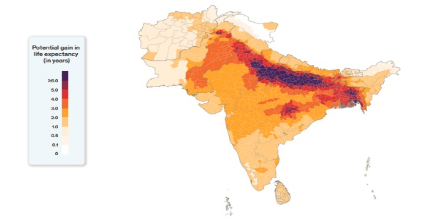Air Quality Life Index (AQLI) 2024 (GS Paper 3, Environment)

Why in News?
- The Air Quality Life Index (AQLI) 2024, released by the Energy Policy Institute at the University of Chicago (EPIC), provides critical insights into the impact of air pollution on global life expectancy.
- The report highlights the severe health consequences of particulate matter (PM2.5) pollution and emphasizes the disparities in air quality across different regions.
Key Findings of the AQLI 2024
Impact on Life Expectancy:
- The AQLI 2024 report reveals that if global PM2.5 pollution were reduced to meet the World Health Organization (WHO) guidelines, which recommend an annual average concentration of 5 µg/m³, the average global life expectancy could increase by 1.9 years.
- This would add a total of 14.9 billion life years worldwide.
Severity Compared to Other Health Risks:
- The report underscores that air pollution's impact on health surpasses that of smoking, heavy drinking, and is significantly greater than other major health risks, including HIV/AIDS and malnutrition.
Distribution of Pollution:
- Pollution is unevenly distributed globally. People in the most polluted areas breathe air that is six times more polluted than that in the cleanest regions, leading to an average reduction in life expectancy by 2.7 years.
Compliance Challenges:
- Despite the establishment of PM2.5 standards in 94 countries, enforcement and compliance are major challenges.
- The report notes that 37 of these countries do not meet their own standards, and 158 countries have not set any standards.
Potential Benefits of Meeting WHO Standards:
- If all countries adhered to WHO pollution guidelines, the average life expectancy in these regions would increase by 1.2 years, highlighting the substantial health benefits of improved air quality.
Global Scenario
US, China, and Europe:
- China: Air pollution has decreased by 41% since 2014, extending the average life of Chinese citizens by 2 years.
- US: Pollution levels have dropped by 67.2% since 1970, resulting in a 1.5-year increase in life expectancy.
- Europe: The reduction in pollution by 30.2% since 1998 has added 5.6 months to life expectancy.
South and Southeast Asia:
- Despite a 4% decline in PM2.5 levels in 2022 compared to 2012, South Asia remains the most polluted region globally, accounting for 45% of the global life years lost due to high pollution.
- Countries like Bangladesh, India, Nepal, and Pakistan face severe pollution challenges. In Myanmar, air pollution reduces life expectancy by 2.9 years.
Africa:
- Central and West Africa have seen little improvement in air quality, with PM2.5 levels averaging 22.2 µg/m³, which is 4.4 times higher than the WHO guideline.
- This level of pollution reduces life expectancy by an average of 1.7 years.
- However, countries like Nigeria, Rwanda, and Ghana have recently started implementing air quality regulations.
West Asia:
- The Middle East and North Africa (MENA) region has emerged as a new pollution hotspot, with air pollution reducing life expectancy by an average of 1.3 years.
- Qatar and Iraq are among the most polluted countries in this region.
Latin America:
- PM2.5 levels in Latin America increased by 4.8% from 2021 and 3% from 1998.
- Bolivia is the most polluted country, with Guatemala’s air pollution reducing life expectancy by 2.1 years.
- Cities like Bogotá, Mexico City, and Quito are implementing measures like driving restrictions to combat pollution.
India-Specific Findings in AQLI 2024
Impact of Cleaner Air on Life Expectancy in Delhi:
- If Delhi’s air quality were to meet WHO guidelines (5 µg/m³), the life expectancy of its 18.7 million residents could increase by 7.8 years.
- Meeting India’s national air quality standard of 40 µg/m³ could add 4.3 years to life expectancy.
Current Air Quality and Trends in Delhi:
- Delhi, which is among the most polluted cities in India, had an average PM2.5 level of 84.3 µg/m³ in 2022.
- Despite this high level, there have been notable improvements.
Improvement Across India:
- Nationally, India saw a reduction in average PM2.5 levels from 49 µg/m³ over the past decade to 41.4 µg/m³ in 2022.
- This reduction could potentially increase the average Indian's life expectancy by 9 months if the trend continues.
Comparison with Other Health Risks:
- Particulate pollution in India reduces life expectancy by 3.6 years, compared to 1.6 years due to malnutrition, 1.5 years due to tobacco use, and 8.4 months due to unsafe water and sanitation.
What is the Air Quality Life Index (AQLI)?
- The AQLI is a comprehensive pollution index that translates the impact of particulate air pollution into its effect on life expectancy.
- By combining the relationship between long-term exposure to air pollution and life expectancy, the AQLI provides insights into the true cost of pollution and the potential health benefits of improved air quality.
How Can We Control Air Pollution?
Prevention:
- Implement pollution prevention strategies such as using less toxic materials, improving industrial processes, and enhancing efficiency (e.g., BSVI engine standards).
Adoption of Clean Air Technology:
- Utilize technologies like wet scrubbers, fabric filters, electrostatic precipitators, and biological degradation to control pollution.
Economic Incentives:
- Implement emissions trading, caps, and other economic incentives for polluting industries.
Scrapping Old Vehicles:
- Removing end-of-life vehicles can reduce emissions by 15-20%.
Work-from-Home Policies:
- Promote remote work during high pollution periods to reduce vehicular emissions.
Artificial Rain:
- Use artificial rain to wash away airborne pollutants.
Behavioral Change:
- Encourage public transportation, walking, and cycling to reduce vehicle emissions.
Conclusion
- The AQLI 2024 report underscores the critical need for stronger air quality management to mitigate the severe health impacts of pollution.
- While there have been improvements, the disparities in air quality across regions highlight the urgent need for comprehensive and enforced policies.
- Meeting WHO air quality guidelines could significantly enhance global life expectancy and overall public health.


